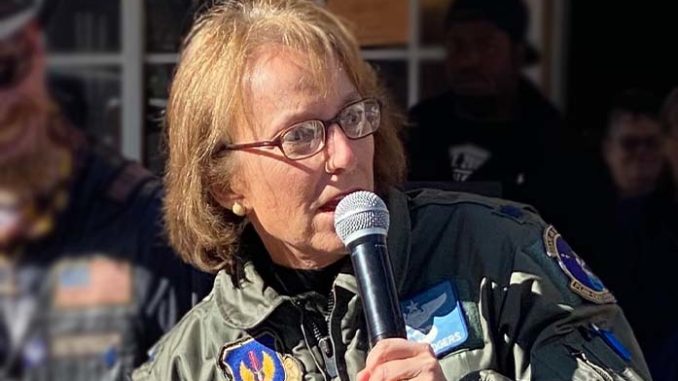
A case which could clarify when political candidates and their campaigns can be sued for defamation has been accepted by the Arizona Supreme Court, whose decision is expected to have major ramifications in how election advertising is conducted.
It was announced earlier this week that the justices accepted a petition for review filed by Pamela Young, owner of Models Plus International, in her lawsuit which claims defamation and false light invasion of privacy against current State Senator Wendy Rogers and Rogers’ husband Hal Kunnen. Rogers’ official campaign committee WendyRogers.org is also a named defendant.
Young alleges Rogers’ unsuccessful 2018 Congressional campaign against then-State Sen. Steve Smith utilized radio, telephone, and direct mail ads which left the impression Young and her Christian-based company were involved in sex trafficking of young children. At the time, Smith had been working for the Phoenix-based agency for more than 10 years.
Oral arguments in the case have been set for Sept. 28, with the parties being given a May 24 deadline to file supplemental legal briefings in what appears to the first case of its kind in Arizona addressing whether a political candidate or campaign committee can be held liable for defaming a third party while attacking a political opponent.
Rogers beat Smith in the 2018 Republican primary for a seat in the U.S. House of Representatives – CD1 but lost in the General Election. She went on to win the State Senate seat for Legislative District 6 in November 2020 but since taking office in January has been the focus of a Senate Ethics Committee probe and an Equal Employment Opportunity Commission complaint.
According to court records, Models Plus International dba The Young Agency is an all-age modeling and talent agency founded by Young in 2001. A radio ad Rogers’ campaign released in 2018 featured a narrator stating, “Smith is a slimy character whose modeling agency specializes in underage girls and advertises on websites linked to sex trafficking.”
One website Rogers claimed Smith advertised on was Model Mayhem, which the ad described as “a website full of pornographic material, which has also been involved in human trafficking.”
Young’s agency is not referenced by name, but anyone could check Google to find out Smith worked for the agency. The result, Young says, is that she and her company were painted as having “committed or supported the commission of sex crimes.”
Rogers’ legal argument is that her 2018 ads never “directly tied the Young Agency to Model Mayhem.” A judge with the Maricopa County Superior Court denied an effort in early 2019 by Rogers to have Young’s lawsuit dismissed, but that decision was overturned in December 2020 by the Arizona Court of Appeals.
If the Arizona Supreme Court reinstates the Maricopa County decision then Rogers will have to put on a defense to Young’s claims.
When the anti-Smith ads came out in 2018, several Republican leaders criticized Rogers for her “carelessness” in involving a third party in an attack-ad. Congressman Andy Biggs called Rogers’ effort “one of the most despicable ads in campaign history” while then-Maricopa County Attorney Bill Montgomery denounced the ads as “the worst kind of politics.”
Montgomery is now on the Arizona Supreme Court but has recused himself from involvement in the Young v. Rogers case.
Rogers’ ads were also attacked at the time by Kathleen Winn, an expert on the issue of child sex trafficking in Arizona.
“If you happen to believe one of your opponents is exploiting children, trafficking minors, selling them on a website for sex producing a political attack ad is NOT your first course of business,” Winn said. “Contacting law enforcement to report the alleged crime is what you need to do.”
Rogers’ run for Congress in 2018 was not her first campaign. She lost the 2016 Republican primary for House of Representatives – CD1 after losing to Krysten Sinema in 2014’s General Election for the House of Representatives – CD9. She also lost the 2012 Republican primary for House of Representatives – CD9 and the 2010 general election for State Senate LD17.
